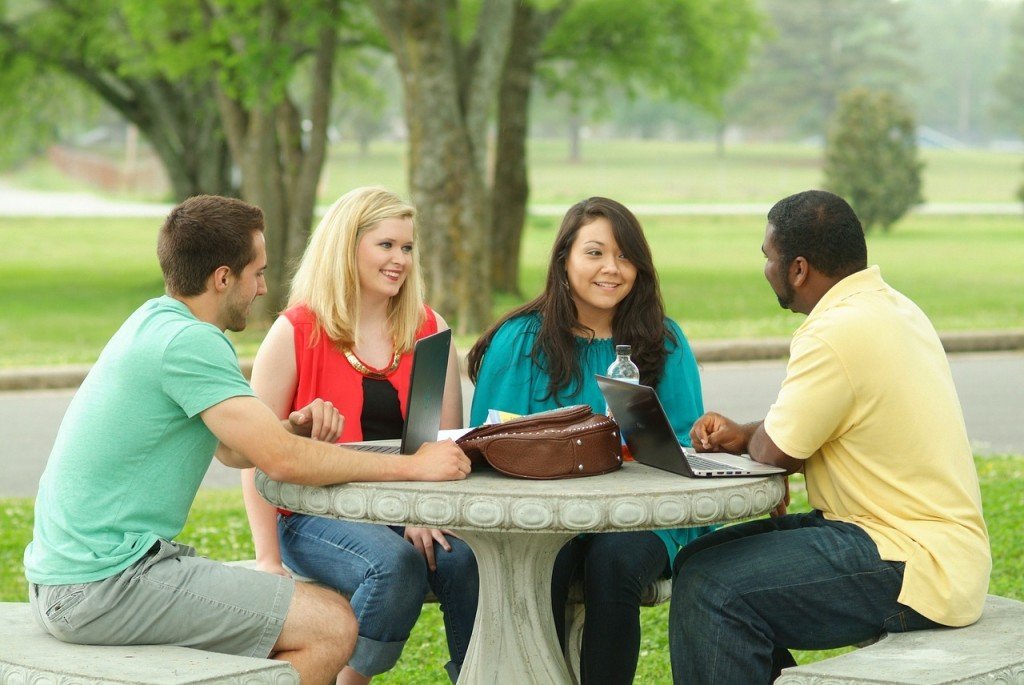
The main purpose of higher education is to prepare for a career, but college is about more than book learning. It’s a time for you to explore your values, develop life skills, and navigate the world without parental guidance. Social skills are crucial not only for job success but for being a member of any community and building satisfying personal relationships. If this is starting to sound like another class, don’t worry. Just follow these five painless tips for developing your social skills and making friends.
1. Get to Know Yourself
Your personality certainly impacts your ability to make friends, hold a job, build a family, and do almost anything else you might want to do in life. Everyone has strengths and weaknesses. Maturity is a matter of working with what you’ve got: focusing on the things you’re good at while improving other areas. Visit your college career center and ask if you can take a personality test such as the Myers-Briggs Type Indicator (MBTI). You can also find free quizzes online that assess your character—and that doesn’t mean “What ‘Game of Thrones’ character are you?”
2. Speak Without Saying a Word
Communication is important. After all, there’s an entire major devoted to it. Poor communication skills can lead to misunderstandings, disagreements, or worse. Strong communication skills will serve you well throughout your life. But did you know there’s more to what you say than … what you say?
Nonverbal communication is referred to facial expressions, body language, and tone of voice. If you feel that you have trouble making friends, see if you can figure out what unspoken messages you’re sending to others. Most colleges require students to take a public speaking course. This is a great place to get constructive feedback on your nonverbal communication. You can also practice speaking in a mirror or take a video of yourself. Observe others as they speak, too. In general, work on standing tall, smiling, making appropriate eye contact, and not speaking like anyone on ‘Family Guy’ (except Brian).
3. Start a Conversation
What you don’t say is important, but what you do say is important, too. If you’re not sure how to start talking to someone new, you can develop a mental cheat sheet. Think of three or four good icebreakers that you can use with almost anyone. You might:
- Ask for directions
- Talk about the weather
- Comment on something a person is wearing, carrying, or doing
You generally don’t want to open with questions like “What’s the meaning of life?” or “Are you seriously going to vote for him/her?” The old rule about avoiding the topics of religion and politics still holds true for the most part.
Once the conversation is started, show genuine interest in the other person. Don’t spend too much time talking about yourself. If you’re interested in continuing the conversation and possibly making a new friend, casually ask the person if they’re going to event X, or ask him or her to join you at activity Y.
4. Capitalize on Unique Situations
So, where are you going to have these conversations? College offers plenty of new activities and experiences. Each exposes you to a new set of people and offers you an opportunity to practice your communication skills. Practice striking up conversations with fellow students until it feels more comfortable. Make an effort to talk to new people at freshman orientation, in the bookstore, at sports events, at the library, in class.
5. Remember: It Only Takes One Person
If you’re looking to make friends, keep in mind that everyone places a different value on friendships. Some people call everyone they know their “friend.” Others may not apply the “friend” label to anyone but their closest confidantes. Know what kind of relationships you’re looking for before you start searching for new friends. Do you want plenty of party pals, several study buddies, or a few BFFs?
If you’re not finding friends, challenge yourself to work through the frustration. Don’t give up and hide in your dorm. The more you put yourself out there, the more likely you are to eventually meet the right people. It only takes one person to turn it all around. That first success will boost your confidence and help you win even more friends.
